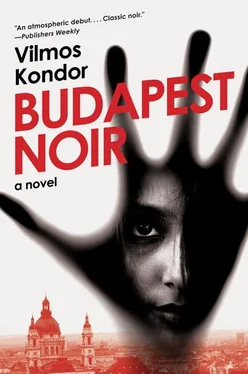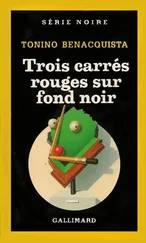“But it’s not the truth, either. And don’t go telling me that you had to hurry back to Budapest because a light bulb went off in your head all of a sudden. I won’t believe it.”
“That is what happened, though.”
“There’s no point in this,” said Krisztina, shaking her head.
“I admit I was wrong,” said Gordon, sitting down beside her.
“That’s awfully generous of you. You’re just superb at admitting it when you’re wrong.”
“What do you expect me to say?”
“If you can’t say the truth, then it’s better you don’t say a thing.”
Gordon took out a cigarette, lit it, and for a while he smoked in silence. “Your wine is cold; I’ll bring you another one.”
“I didn’t even want to drink this,” said Krisztina with a dismissive wave of the hand. “But in exchange for everything you’ve told me, I’ll now tell you something.”
“Go ahead.”
“This afternoon I wired London to say I’ve accepted the job. I’m just waiting for their reply, then I’m off.”
“I understand.”
“If you understood, you wouldn’t have shut me out of the case.”
“I didn’t shut you out. It’s just that I didn’t want to talk about it until I knew everything. Or at least almost everything. Don’t be mad.”
“I’m not mad at you, Zsigmond.”
“No?”
“You want me to be mad?”
Gordon shook his head. “Not necessarily.”
“Then what do you want?”
“I want you to listen to me,” Gordon replied. He then told Krisztina everything that had happened since he’d returned to Budapest. Krisztina listened in silence, neither asking a thing nor nodding, just sitting there staring out at the city.
“And what do you want to do next?” she asked when Gordon finished.
“I’ve got unfinished business with Pojva.”
“What will you do with him?” asked Krisztina. “Beat him up?”
“Don’t kid around,” he said. “What do I care that he did that to me?”
“Zsigmond, at least admit to me that he could knock your head off with his bare hands. Even if you don’t admit it to yourself, admit it to me. You want vengeance, that’s what.”
“Maybe you’re right,” said Gordon. “But it’s not that simple.”
“Nothing is that simple.”
“Pojva thinks he’s the only one who can play dirty.”
“I don’t want to know what you’re planning.”
“No?”
“I want to pack. My clothes—in a suitcase.”
Gordon pushed his hat up over his forehead. “But not tonight, right?”
“No,” replied Krisztina. “Not tonight. Take me home.”
“All right,” said Gordon, standing up. “Let’s go.”
Czövek was slumped over the wheel, fast asleep. Gordon tapped the glass, at which the cabbie snapped to attention. “I’m off already,” he said in a drowsy voice.
“Wait until we get in, huh?”
“Should I hurry?” asked Czövek, turning around.
Gordon looked at Krisztina, who nodded. “Hurry, Czövek, hurry.”
Ten
Gordon was in the bathroom, shaving, when Krisztina appeared in the open door. “And where are you off to?” she asked.
“I’m on duty,” he replied.
“Starting at 8 P.M. And now, if I’m not mistaken”—she looked at her watch—“it’s just past 8 A.M.”
“I’ve got to pay Gellért a visit this morning at police headquarters.”
Gordon finished shaving; he needed hardly any alum. He put on a brown sport coat but couldn’t manage his necktie.
“Will you tie this for me?” he asked, as he stepped from the bathroom.
Krisztina looked up from behind the writing desk. “Come over here.”
“What are you working on?”
“Setting a few ideas on paper that have been in my head. So I have something to show Penguin.”
“The publisher.”
“Who else?”
“I hope they like them.”
“So do I.”
Krisztina leaned back over her drawings as Gordon stepped to the telephone and dialed police headquarters. Gellért was already at his desk.
“Did you accept my advice?” asked the detective on hearing Gordon’s voice.
“In a certain sense, yes.”
“What sense?”
“I’d rather tell you in person. And we should talk about two women as well.”
“Who?”
“One is named Fanny,” replied Gordon, “and the other, Irma.”
“I can’t talk now.”
“When, then?”
“What would you say to an early lunch—at noon?”
“Fine by me. Where?”
“The Guinea Fowl, on Bástya Street. Know the place?”
“I know it,” said Gordon, putting down the receiver.
Krisztina glanced at Gordon only for a moment before going back to her drawing. Gordon went to the desk and took out a little notebook packed full of addresses from a drawer. He paged through it and dialed again.
“Hullo,” said a man with a strong British accent at the other end of the line.
“This is Gordon. Do you have an hour to spare this morning?”
“An hour?”
“An hour and a half.”
“An hour and a half?”
“That’s all.”
“I’m sure I do,” replied the man.
“Ten o’clock in the Abbázia?”
“I’ll be there. Cheerio!”
“Bye,” said Gordon, putting down the receiver.
He put on his trench coat and stopped in the doorway on his way out.
“Are you off already?” asked Krisztina.
“I’ve got to go,” replied Gordon. “I’ll call you tonight from the newsroom.”
“Whatever you want,” replied Krisztina, leaning over her paper once again.
Gordon glanced at his watch. It was just past 11:30 A.M. He waved a hand to the waiter to bring the bill. The man seated across from Gordon closed his notebook. “Lord Beaverbrook will decide if we’ll start writing about Hungarian politicians and their love lives,” said the correspondent from the Daily Express. “I can’t promise a thing.”
“I wouldn’t expect anything else,” Gordon replied.
“I can’t just base this on gossip, either,” said the journalist from under a shock of thick red hair.
“I know.”
“You think this Margo will help me?”
“I’ll have a chat with her.”
“You do that.” He paused momentarily. “I admit I’ve heard some of this already. This sort of thing isn’t customary back in our country.”
“That’s precisely why it could be interesting.”
“I’ll ask around, too,” said the Englishman with a nod.
Gordon paid the bill, shook hands with the correspondent, and boarded a tram in front of the coffeehouse. On Berlin Square he transferred to another to Calvin Square. He walked along Kecskeméti Street, turning onto Bástya, and was already in the Guinea Fowl a couple of minutes before noon. Gordon took a quick look around the restaurant’s dimly lit interior but did not see Gellért. The tables were occupied mostly by men: a mix of students and instructors from the nearby Pázmány Péter Catholic University. Even though it was midday, the place was still not full. Not just anyone could afford to dine at the Guinea Fowl.
The waiter led Gordon to a table in the back and asked Gordon what he’d like.
“Just a coffee for now.”
He had just opened a newspaper when the chief inspector appeared beside the table. A drenched jacket hung from his lanky frame, water trickling off his umbrella, his hat sopping wet.
“Lovely,” he said by way of greeting, “I see that you stayed dry.”
“I arrived before the rain.”
“Have you ordered already?”
“Not yet.”
Gellért waved for the waiter, who took away his jacket, hat, and umbrella, then brought them two menus. Gordon ordered a large bowl of consommé including not one but two eggs, and Gellért ordered beef paprikash sautéed with red wine, potatoes, and lard-fried onions.
Читать дальше
Конец ознакомительного отрывка
Купить книгу












